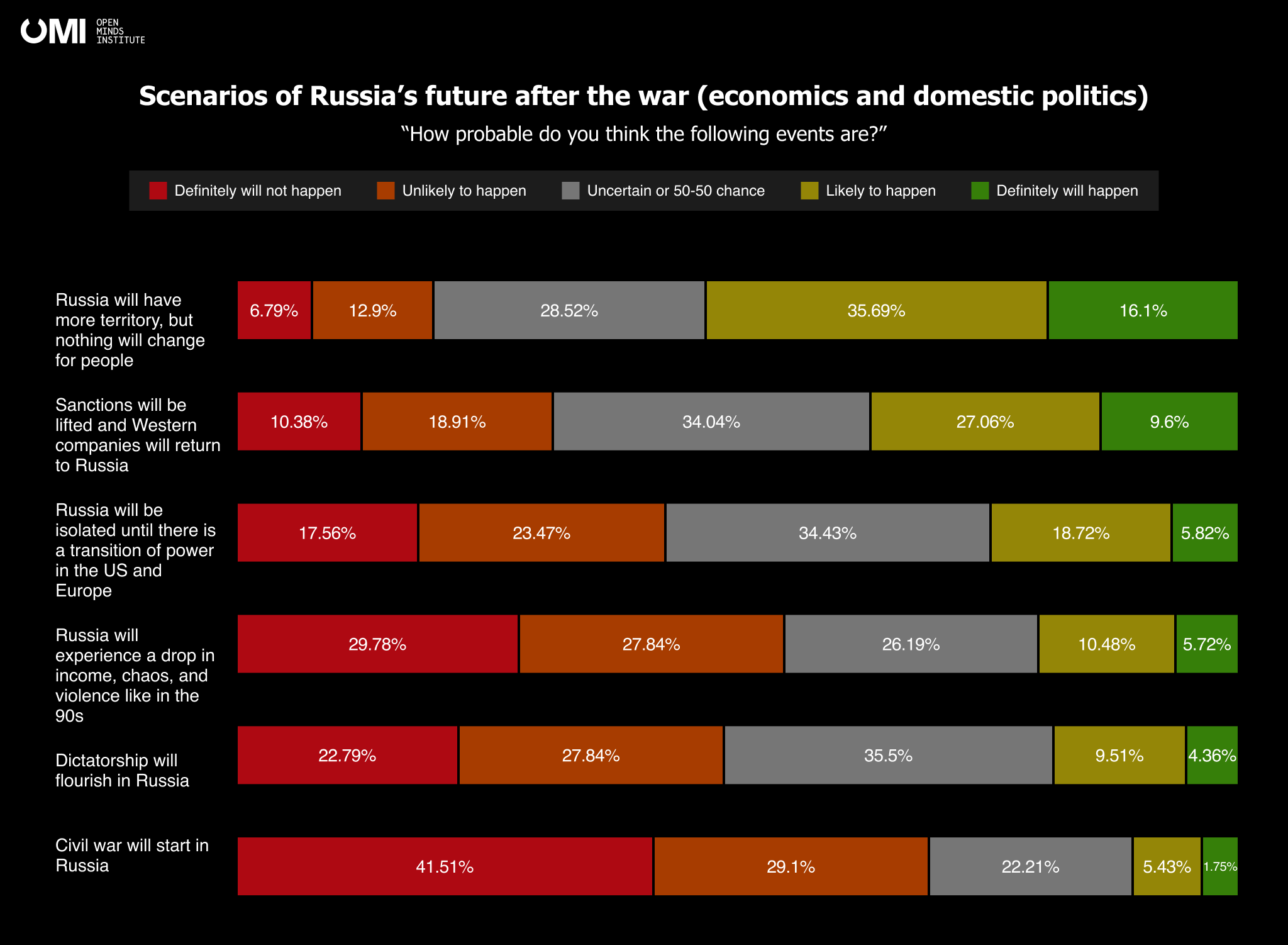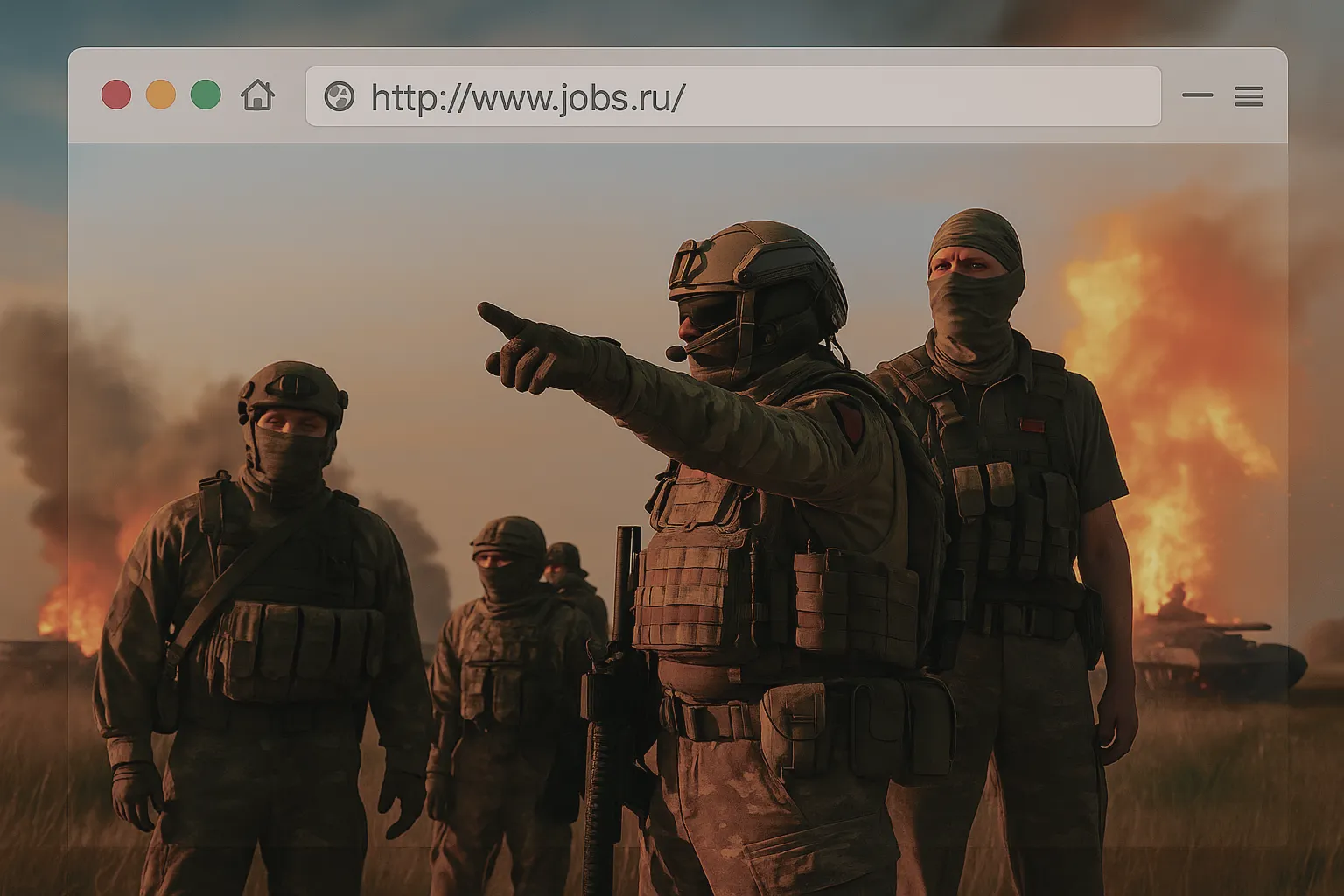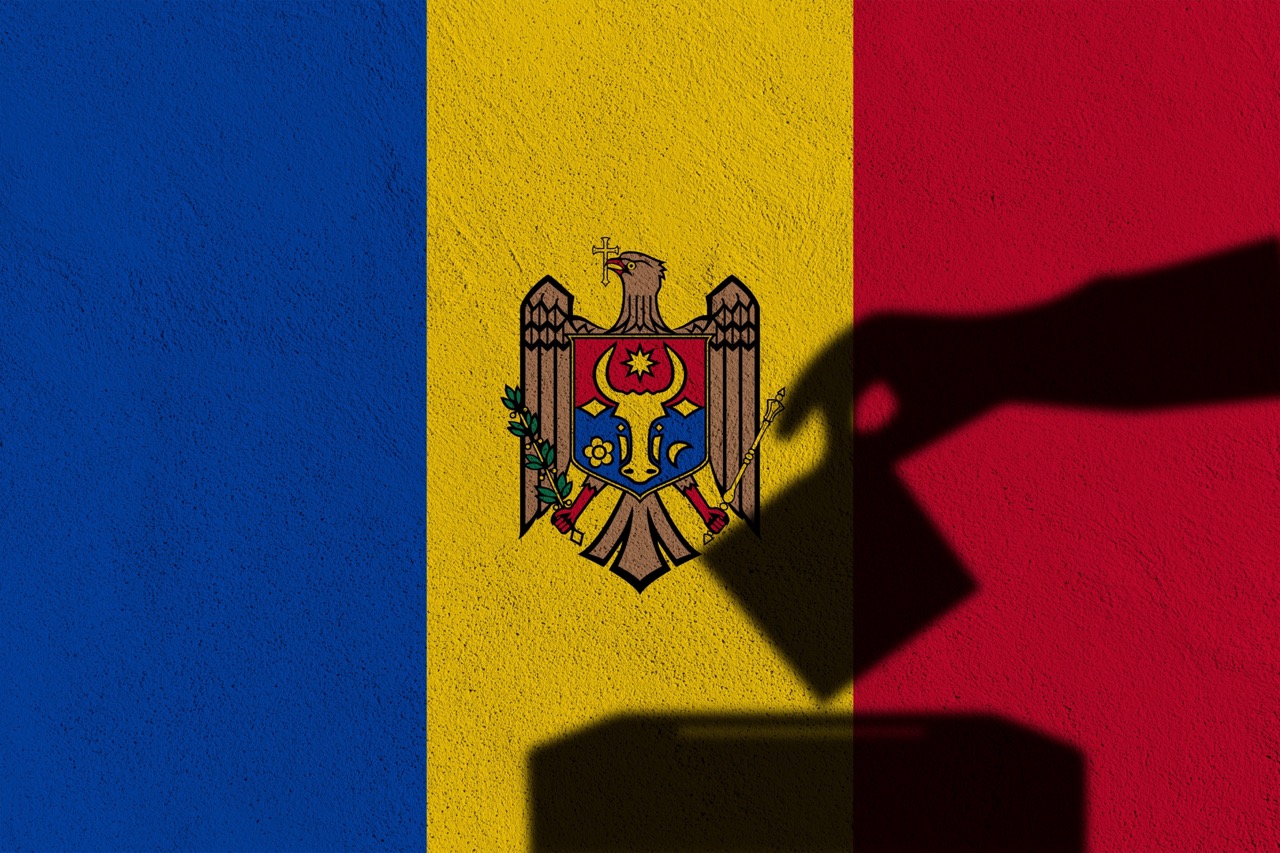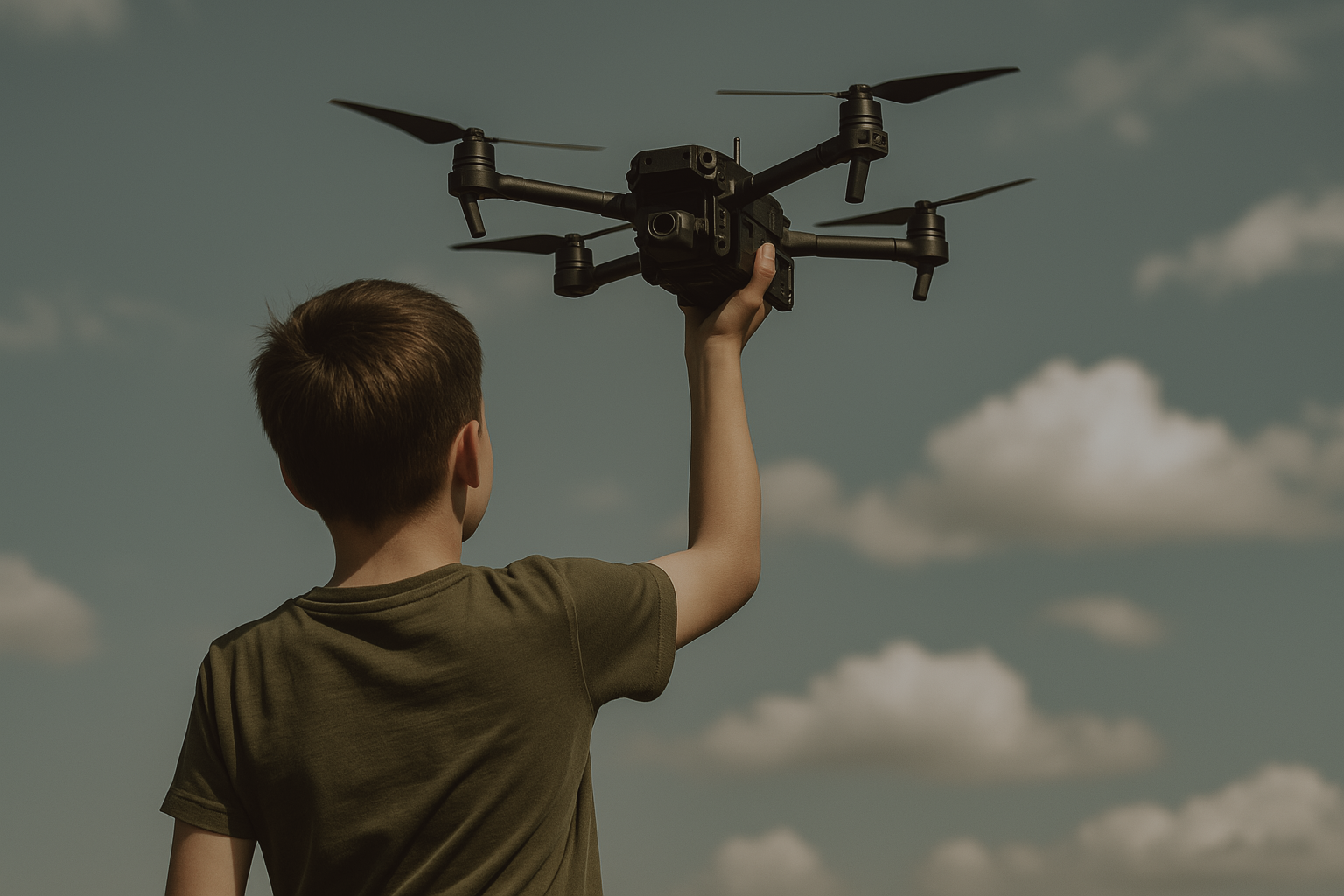
What’s Next For Russia?: Assessment Of The War Impact And Outcome By Russians
Introduction
{{margin-small}}
What is worse for Russia – to win or to lose? To return the occupied territories but preserve the last bits of dignity, or to keep the burned land the Russian army left after offending and occupying?
Open Minds Institute conducted a study where we proposed different scenarios of the invasion aftermath and asked Russians to assess them.
This report covers the attitudes towards different further courses of Russia's war against Ukraine, its outcomes and consequences, and the prospects for relations between Russians and Ukrainians after the end of the war.
{{margin-big}}
Executive Summary
{{margin-small}}
- One argument for Russians to support an unjustified war against Ukraine is the belief that the defeated country's people will suffer greatly. Over half of respondents (53.25%) fear that a loss in the war could worsen living conditions and quality of life. A slightly smaller but still significant percentage (45.39%) anticipate life improvements following a military victory.
- Respondents believe Russia will win in Ukraine (55.29%), but peace will take time (31.43%). Some think Ukraine may cease to exist (30.84%), while others expect concessions from all parties in a settlement (38.8%). Few predict a new mobilization or further escalation. The least likely beliefs are Ukraine's victory and escalation into a global conflict or nuclear warfare by Russia (4.56%).
- 60.23% believe Russia will maintain its position as a great power. 53.35% expect a negative attitude towards Russians in Western countries. 53.34% are confident that Russia's interests will be respected globally. 51.79% do not foresee any improvement in the lives of ordinary people due to territorial expansion.
- These figures indicate that Russian propaganda has been successful in fostering a sense of national superiority and the desire for Russia to be feared and respected in the world.
- Only a small percentage have faith in scenarios like Russia's collapse (5.33%), civil war (7.18%), dictatorship (13.87%), or a return to the chaotic quality of life of the 1990s (16.2%).
- 57.13% of respondents hold a realistic view of future relations between Russians and Ukrainians and believe they will deteriorate. 10.96% believe that these relations will improve. However, 12.03% of respondents believe that Ukraine will cease to exist due to either destruction or annexation by the Russian army.
{{margin-big}}
Methodology
{{margin-small}}
Sample
Respondents were recruited online. The data was collected on August 7th.
The sample was stratified by sex and age (equal age and sex groups 18-30, 31-44, 45-60 years). The data was cleaned, and the analysis excluded people who did not answer all the questions. The final sample comprised 1013 respondents, 508 women, and 505 men. The mean age of the respondents is 34.51, and the standard deviation is 11.56. The sample included residents of all federal districts of Russia.
{{margin-small}}
Study Design
Respondents were asked a series of questions about their socio-demographic characteristics, support for the invasion of Ukraine, views on the direction of their country's development, and attitudes toward peace negotiations.
On July 18, a pilot study was conducted in which 250 Russian respondents gave detailed answers to open-ended questions concerning the future of the current war, Russian statehood, government, and economy. The most frequently encountered responses formed the basis for the main stage of the survey of Russians' thoughts toward the war outcomes, which are described in this report.
In the questionnaire for Russian respondents, we used the term "special military operation" (”SMO” for short) rather than "the war" since this euphemism is a state-approved term to address the war against Ukraine. We consider war to be a war, but when interacting with the Russian sample, we are forced to use the term "special military operation": the term "war" cannot be used under pain of criminal penalties, and many Russians will refuse to answer if you ask them about "the war.”
{{margin-big}}
Key Findings
{{margin-small}}
War and Russian’s Quality of Life
One of the arguments in favor of supporting a war, even if one believes it is unjustified, is the belief that the people of the defeated country will suffer greatly. This can lead to a utilitarian justification for the war: "Even though we are wrong, we have to go all the way and win because the consequences of defeat would be worse.”
Over half of Russians (53.25%) fear that a loss in the war could lead to a worsening of living conditions and quality of life. However, a slightly smaller yet still substantial percentage of respondents (45.39%) anticipate life improvements following a military victory.

The Pierson correlation between the support of war and the belief that if Russia loses, the life of Russians becomes worse is 0.27, p > 0.001, between the disagreement with the necessity to stop the war and such a belief: 0.21, p > 0.001.
The association between backing the "special military operation" and concerns that defeat could exacerbate living conditions can be interpreted in two ways: people may support the war because they associate defeat with deterioration in the quality of life, or conversely, they may view defeat as harmful because they support the war. Either way, the idea that a loss in war will negatively affect living conditions aligns with the war-justifying rhetoric commonly employed in Russian propaganda.
{{margin-small}}
War's Outcome: Russians' Predictions on its Impact and Aftermath
13 scenarios of the future of the war identified during the pilot study, which utilized open-ended questions, along with others actively deliberated within the expert community (particularly, the potential use of nuclear weapons by Russia), were selected to evaluate potential developments and outcomes of the war.

The respondents generally believe that Russia will achieve an unequivocal victory in Ukraine but that the road to peace will be long. Slightly less than a third of respondents believe that Ukraine will cease to exist, while 38.8% believe that all parties to the conflict will be forced to make concessions in any negotiated settlement.
They are least likely to believe in Ukraine's victory and the return of its territories, as well as that the war in Ukraine is likely to escalate into a wider conflict as in catastrophic scenarios such as World War III or the use of nuclear weapons by Russia.

Respondents, in general, do not really believe that a new mobilization will be required or that another war will be necessary after this one ends.

{{margin-small}}
What will happen to the Motherland and us?
We asked respondents to estimate the probability of scenarios about foreign and domestic politics.
60.23% believe that Russia will defend its position as a great power, while 53.35% say that the attitude towards Russians in Western countries will be bad. The same number (53.34%) are confident that Russia's interests will henceforth be reckoned with in the world.
These figures clearly demonstrate the success of Russian propaganda, which recreates and strengthens the feeling of national humiliation of Russians, which naturally translates into the desire that "we should be feared and respected in the world.”

According to 51.79% of respondents, "ordinary people" will not feel any improvement in their lives as a result of Russia's territorial expansion. Respondents have little faith in the collapse of Russia (only 5.33%), in the likelihood of a civil war (7.18%), in a dictatorship that seems to have already de facto arrived (13.87%), or in rampant banditry and deterioration of the quality of life, as it was in the 1990s (16.2%).

{{margin-small}}
Relations between Russians and Ukrainians will worsen
57.13% of respondents have a realistic view of future relations between Russians and Ukrainians. At the same time, 10.96% believe that relations will even improve, while 12.03% say that Ukraine will not exist because it will be destroyed or annexed by the Russian army.

In one of the first questions, 30.84% of respondents agreed that Ukraine will disappear (9.21% unconditionally and 21.63% rather agreed). However, in this question, only 12.03% expressed belief in Ukraine's disappearance due to war.
{{margin-big}}
Conclusions
{{margin-small}}
While most Russians believe in their country's victory in the war, they also acknowledge that achieving peace will require time. The majority of respondents doesn’t believe their life will improve due to territorial expansion, but they fear the level of well-being they have now to degrade because of the military defeat.
As can be concluded from the study, the effectiveness of Russian propaganda is evident, as it has found fertile ground in shaping public opinion. Despite military setbacks, there remains a strong belief in victory over Ukraine.
The aspiration for greatness on the world stage is also widespread in Russian society. These common ideas highlight the impact of propaganda and underscore the challenges in fostering more humanistic and forward-thinking perspectives in the country.

.svg)








.png)
















.png)

.png)




.png)








-01-2.jpeg)
-01.png)
-01.png)




-01%25202-p-500.png)







